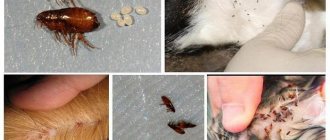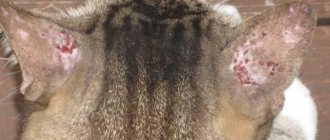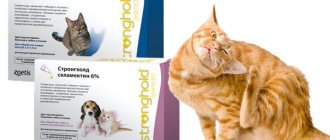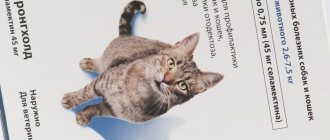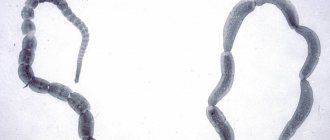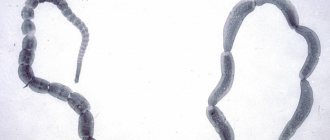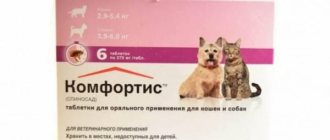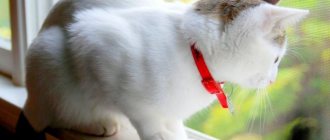Today, veterinary pharmacies and pet stores have a huge selection of anti-flea medications. However, sometimes it is better not to use insecticides to treat your pet. In such a situation, natural anti-flea remedies will help the owners.
We will find out what folk remedies for fleas exist, how effective and how dangerous they are, as well as how to use them correctly to quickly cure your pet.
Which is better: chemical flea preparations or folk remedies?
The main advantage of folk methods of getting rid of blood-sucking insects is accessibility. Almost every home has garlic, and you can buy chamomile, wormwood essential oil or herbal mixture at the nearest pharmacy or supermarket.
Using folk remedies (especially oils, wormwood or garlic), prepare for a strong and persistent smell in the house. Some animals (especially puppies and kittens) do not tolerate them well. Oils can cause allergies or rashes, and some substances (tansy, boric acid and vinegar) can cause severe poisoning. When using such drugs, you should be especially careful, follow the recommended dosages and monitor the behavior and condition of your pet.
Under no circumstances should your pet be allowed to lick its fur: even a small amount of herbs and oils with a strong odor can cause vomiting, diarrhea and worsening of the condition. Traditional methods of getting rid of parasites are safer in this regard: shampoos, sprays, tablets and drops on the withers.
Many products are very inexpensive, but do not cause allergies or side effects. They can be used even by babies (from 2 weeks), nursing and pregnant cats and dogs. Such products are also made on the basis of natural ingredients, herbs and oils, which care for the coat and make the combing process easy and enjoyable.
Immediately after identifying fleas on an animal, you must begin to fight them.
Cedar sawdust or ground walnut shells
It's a known fact that fleas hate the smell of pine nuts—and your cat probably doesn't like it very much either.
However, you can try placing cedar shavings or ground shells around your cat's bedding or outdoors in the garden.
You can also spray cedarwood oil on your cat's fur, as it is a safe, non-toxic essential oil, or apply a few drops to a banana peel or even your cat's collar to keep bugs away.
How to get rid of parasites from animals
One of the easiest ways to control fleas on cats and dogs is combing.
Removing fleas from cats
To rid your pet of parasites:
- Prepare a special brush and a bowl of warm soapy water.
- Add any of the products to the solution (list of options below).
Crushed garlic is a powerful remedy against blood-sucking parasites and microbes - Soak a fine-toothed comb in the prepared mixture and comb the fur according to the hair growth. Particular attention should be paid to the abdomen, groin area and armpits. When combing fleas from small kittens, it is better not to touch the forehead and neck, so as not to injure the animal. Wet the comb in the solution every time. It is better to crush the caught fleas or throw them into the water.
Brushes with frequent and sharp teeth are ideal for combing. - Finally, soak a cotton pad in the solution and wipe the hairs and skin of the animal. Wrap the cat in a towel and hold it for several minutes (five to ten). During this time, the product will take effect and the remaining fleas will fall off; comb them out with a comb.
By wrapping the kitten in a towel, you increase the effectiveness of the procedure
This method is not suitable for newborn kittens and babies whose hair is thin and weak. Kittens under 3 days old should not use any products at all.
From three days of age, you can start combing or buy a special product (for example, Frontline). This product is available in two forms: spray and shampoo.
"Frontline" is suitable for kittens from three days of age
Removing fleas from dogs
To remove fleas from a dog:
- First, examine your pet. A preliminary inspection will help determine the extent of the problem.
When examined, fleas on dogs' fur look like small black dots. - Prepare a basin or bathtub for bathing. It is convenient to bathe small dogs and puppies in a basin, while large dogs can be bathed in a bathtub. Pour warm water into a container, dissolve a little laundry soap (liquid or solid). Prepare a towel and comb.
Regular bathing with laundry soap will help cope with most parasites - Thoroughly lather the fur with laundry soap and comb out the fleas with a comb directly under running water. This will wash away the parasites, and they will not be able to cling to the hairs again.
When bathing your dog, hold the shower with one hand and comb out parasites with the other. - After bathing, repeat the combing procedure, then dry the animal with a towel. For prevention, place a bunch of wormwood, sawdust or spruce branches under the bedding. Before doing this, thoroughly wash the carpets, treat furniture and bedding where parasites could remain, with a soap solution or water with added oils or herbs.
Wormwood is one of the most effective folk remedies for fleas
Lavender and chamomile
A gentle way to soothe your pet's skin—and maybe even help him or her get some sleep—lavender is actually a powerful, fast-acting flea killer.
In fact, some studies have shown that mixtures containing diluted lavender were as effective at killing fleas as commercial chemical sprays.
To use lavender at home, let fresh lavender soak in water overnight before straining the liquid and spraying it onto your cat's fur (no need to rinse).
Another compound known for its skin-soothing properties, loose chamomile tea can also be used to attack fleas on your feline friend.
Simply brew the tea and, when completely cool, apply the liquid to your cat's fur. You can repeat both procedures daily for as long as necessary.
How to remove fleas from your home
To get rid of parasites in your home:
- First, wash the floor with a solution containing soap, alcohol, lavender or peppermint oil. Such strong odors will repel parasites.
Washing the floor with aromatic additives is a procedure that no parasite can withstand - Wash the walls and baseboards with the same solution. Keep in mind that fleas can rise to a height of up to a meter from the floor.
Be sure to wear rubber gloves when cleaning - Wash clothes, bedding, carpets, furniture covers and pet bedding.
Washing bedding and towels is an important step that will allow you to get rid of parasites forever - Take pillows, blankets and mattresses outside. Parasites cannot stand heat, cold and sunlight, so they will immediately run away from their homes.
- After the general cleaning is completed, place bunches of tansy, mint, wormwood or spruce branches in all corners.
The safest thing to do in your case is to use regular cleaning and a steamer, which will reduce the number of fleas.
Sergey
https://vetdoc.in.ua/kak-unichtozhit-blox-v-kvartire-sovety-veterinara.htm
in order not to harm yourself, use physical control measures - high temperature, if there is no steamer, you can use an iron with a steaming function to process the mattress; if the fabrics are natural, then you can simply iron them with an iron, there will still be a positive effect.
But treatments need to be done regularly - once a week. 2. When frosts begin, you can take the mattresses outside, if possible. Sergey
https://vetdoc.in.ua/kak-unichtozhit-blox-v-kvartire-sovety-veterinara.htm
Apple vinegar
Another grocery store product that fleas don't particularly like is apple cider vinegar. While apple cider vinegar is not effective at killing bugs, it can cause fleas to jump out of your cat's body so you can better treat the problem, making it a great first attack in your personal war against fleas.
Try mixing apple cider vinegar with water in a 2:1 ratio and spraying it onto your cat's fur.
Fleas can be a very stubborn bunch, so you may have to go through several home treatments of applying vinegar to your cat's fur to get rid of fleas completely.
You'll also want to vacuum all floors and upholstery (and throw away the vacuum cleaner bag immediately), wash all bedding in hot water, and consider removing pet food bowls, bird feeders, trash cans, and any other food sources from your yard. to avoid attracting wild animals that could reinfect your pet.
Folk remedies for fleas: effectiveness and application features
There are many remedies in the arsenal of traditional medicine that help get rid of parasites.
Tar soap
Tar soap consists of sodium salts (like all soaps), table salt and thickeners. The composition includes citric acid and birch tar. It is the latter substance that fights parasites. Tar also has an anti-inflammatory effect, eliminates itching and slightly dries the skin.
Birch tar is an effective remedy that is added to soaps, ointments and medicines for the treatment of inflammatory skin diseases, irritation, and redness. This substance has excellent repellent properties for insects, including fleas.
This natural product is suitable for repelling fleas on puppies, kittens, pregnant and lactating females. Even if wounds have formed on the skin of a dog or cat from constant biting and scratching, you can use tar soap.
This product, unlike specialized medications, is inexpensive and does not contain artificial flavors or dyes.
Our grandmothers used tar soap to remove fleas.
Recently we discovered fleas on our Cornish cat, and our couch potato cat has FLEAS!
Nightmare, horror and panic! Probably brought from the street. While going to the pet store - immediately wash the clothes/bedding, wash the cat... Yes, yes, we thoroughly wet it with warm water and thoroughly soap its paws/belly/sides with tar soap. Avoid ears and mucous membranes. Our disgruntled cat stood in the foam for a couple of minutes. The main thing is that it stopped itching and no one jumps on it (after 2 days, just in case, they washed it again). ArLety
https://irecommend.ru/content/degtyarnoe-mylo-dlya-menya-sredstvo-ot-perkhoti-i-molochnitsy-dlya-kota-sredstvo-ot-blokh-ta
One of my friends advised me to wash my dog with tar soap, there will be no skin problems, fleas and other nasty things.
That’s right, the fur was less itchy, he didn’t itch as much as before, we didn’t notice any fleas either, the lichen went away faster than expected, and in general the fur looked shiny and looked very healthy!!! Anna Fomkina
https://irecommend.ru/content/myli-sobaku
Herbs and plants for fleas
Plants such as tansy, chamomile and wormwood have proven themselves well in the fight against fleas.
There are a lot of herbs, the infusion of which helps protect your dog from fleas.
It can be tansy or ordinary wormwood. It won't be difficult to find her on the field. The smell is pungent, but there will definitely be no trace of fleas left. And the season for fleas is short, they usually only torment dogs in the summer, and when winter comes, that’s it. Fleas are afraid of the cold. Antonina
https://www.mydog.su/forum/narodnye-sredstva-ot-blokh-u-sobak
Sagebrush
To combat parasites, wormwood is used in several ways:
- 50 grams of dried wormwood are poured with a liter of boiling water and left for an hour. This infusion is added to bathing water for a sick animal or used to clean rooms where uninvited guests have settled;
- 25 g of dry grass are mixed with fresh raw materials (50 g), poured with water (0.5 l). Place on fire and let stand for several minutes, leave for 40 minutes. After filtering, spray the broth in the room, wash the floors, and also apply it pointwise to the animal’s fur, and then rub it with your hands;
- 2–4 teaspoons of herb are infused in 0.5 liters of vodka or alcohol for 2 weeks. The product is used for washing floors and furniture (10 ml of tincture per 1 liter of water);
- Wormwood powder and brooms are placed in hard-to-reach places in the house and apartment (in corners, attics and behind cabinets). The smell repels fleas and prevents re-infection of animals.
Wormwood is a plant from the Asteraceae family with a bright aroma and bitter taste.
The plant is not poisonous, it does not harm the health of the pet, it is only important to make sure that there is no allergy to the grass. In addition, the animal is unlikely to lick the fur, since preparations based on the plant have a bitter taste.
I had a similar story with parasites.
The cat suddenly got fleas (she doesn’t walk outside with me). I tried a lot on the poor animal, scoured the entire Internet and this is what I found out: flea control is not enough to get rid of parasites, you also need to treat the room, since fleas like to hide in the cracks of baseboards and parquet. So I bought a cat in an infusion of wormwood, put on a collar and moved in with a friend for a couple of days, and called exterminators into the apartment. Only after this did I manage to get rid of the fleas. Lera
https://www.woman.ru/home/animal/thread/4312013/
In our basement there are fleas living on stray cats, and when we go for cans, they inevitably end up in the house.
We got rid of it with the help of wormwood, we bought it at the pharmacy. We did it as the solution was written on the package, only to be sure, I doubled the dose, just to be sure, and sprayed the walls, carpets, and beds liberally. Then I washed the floors. I didn’t believe that it would help, but they left. kruchek_nv
https://forum.ditenok.com/showthread.php?t=34939
Chamomile
Chamomile can be used to control pests, but not ordinary chamomile, but Persian chamomile. The plant contains pyrethrins - substances that are effective in combating various insects. The closest relative of this herb is Caucasian chamomile. It is no less effective and easier to find.
Chamomile is used to combat fleas, but not ordinary chamomile, but Persian chamomile
The plant needs to be dried, crushed and scattered around the house, paying special attention to hard-to-reach places and animal beds. You can also lay out a fresh plant.
Persian chamomile is added to special insecticidal products for fleas (for example, Lugovoy shampoo).
Shampoo "Lugovoy" - a natural and modern flea remedy for dogs and cats
It’s better not to put chamomile, but wormwood.
We used to even put it in the dog’s kennel in the village, and somehow we had to treat the sofas at home. But this is the safest way, otherwise everything needs to be processed. Lyra
https://www.nn.ru/community/my_baby/my_baby/blokhi_v_kvartire-_ili_kak_ya_skhozhu_s_uma.html
Tansy
The essential oils contained in this plant repel fleas with their scent. To get rid of parasites, stems with inflorescences are used both fresh and dried (30 grams of inflorescences or dry tansy powder per glass of boiling water).
Some sources recommend wiping the pet’s fur and skin with the resulting product and using the liquid to clean the premises.
It is worth noting that an infusion of flowers effectively copes with parasites only if the flea is completely immersed in a product that is dangerous to it, so it is much more effective to bathe your pet in a medicinal bath with tansy (the liquid is prepared in the same proportion). As for treating premises, this remedy is suitable for prevention, but its usefulness for getting rid of parasites is questionable.
Targeted use of the infusion is ineffective: the parasites simply move from one place to another.
The bright yellow plant, found throughout the country, is an excellent flea repellent for pets.
I tried to use tansy and wormwood, other “flavors”.
But what causes fleas to run away can it be harmless to a dog? I learned that you can use stove ash (not to be confused with soot) to control fleas. In my opinion, this is completely unacceptable for a dog. Moreover, fleas have already adapted to modern ecology. My “dog” experience tells me that we need to stop doing experiments on our pets. I am for modern means of protecting dogs. Anvani
https://www.mydog.su/forum/narodnye-sredstva-ot-blokh-u-sobak
Garlic
Fragrant cloves are placed in corners, on shelves, in cabinets and on baseboards to scare away unexpected guests. An infusion is prepared from garlic (for wet cleaning) or scattered around the apartment in crushed form.
Tomorrow I’ll go looking for neostomozan, otherwise I’m already tired of scattered garlic around the apartment) although it helps.
Daria
https://www.woman.ru/home/medley9/thread/3852484/6/
Bay leaf
The fragrant seasoning is used both in dry form and in the form of tincture. Dry leaves are laid out in corners and crevices to repel parasites throughout the house, and the infusion (10 grams of leaves per glass of boiling water) is sprayed on the home.
Essential oils for fleas
Essential oils can be used effectively to treat rooms when treating pets.
Most often, oils are used in the form of a suspension by mixing the selected product with some water.
Add 25 drops of oil to five liters of water. The resulting solution is used to treat shelves, baseboards, and floors. After filling the spray bottle with the product, treat furniture, curtains and corners in the apartment that are difficult to clean with a rag and vacuum cleaner.
The following oils are suitable for preparing the solution:
- lavender;
- mint;
- tea tree;
- carnations;
- eucalyptus;
- anise;
- cedar;
- pine trees;
- thyme;
- wormwood.
Oil is also poured into small open bowls or jars and placed around the house. The smell repels pests, and they run away in search of a new home.
Essential oils have strong antiseptic and insecticidal properties due to the plant substances they contain.
Oils are not only well suited for treating premises, but are also used as drops on the withers. Use such homemade “drops” with extreme caution, as if they get into the mouth they can cause serious consequences and cause a loss of smell in tailed pets.
When using oils for cleaning or as medicine for the first time, be sure to perform an allergy test. Oils should not be used in a home where there are pregnant women and small children.
Oils of bergamot, eucalyptus, geranium, lavender and others are effective insect repellents, and when using them, you can even completely abandon synthetic flea products for dogs and cats.
It is enough to wipe the animal's fur with one or two drops of oil. Dogs are generally more tolerant of this type of grooming than cats, and their fur can be rubbed or combed with a mixture of these oils diluted in oil and then water. For cats, it is better to use lavender oil. Rub a couple of drops of oil in your palms and simply stroke the cat. Some cats will tolerate this procedure without objection, but others may not like it. If you have a fluffy cat, then put some oil on the brush you use to brush it. The same method can be used on a dog if you don't want to get its fur wet. Patricia Davis
Aromatherapy from A to Z
Lavender oil is a pleasant and useful remedy for the treatment and prevention of fleas in pets.
This is nonsense... I took SO many of these ampoules and once I even got poisoned myself, but after a couple of weeks it all started all over again... But what helped was COCONUT OIL!!!
Refined, deodorized, absolutely safe for us warm-blooded people, I bought it where everything for soap making at home is sold, I smeared it on my cats and the floor and that’s it! no more problem! It is also anthelmintic, so when cats licked it off they were also prevented from these parasites. Since my cats go outside, I repeat the procedure once a month. SVT
https://forumodua.com/showthread.php?t=484346
I treated my dog for fleas with a mixture of lavender and tea tree.
It seems they don’t download Cerise
https://forum.aromarti.ru/archive/index.php/t-937.html
Spices
One of the easiest things you can do for a flea-infested cat is to revive its life with natural ingredients you can find in your kitchen.
Because of a natural compound known as carvacrol, oregano oil can be very effective in removing fleas; Start by mixing one teaspoon of oregano oil with three teaspoons of olive oil and apply a small amount of the solution to areas where fleas tend to congregate, such as your cat's ears, belly, tail, and neck.
Fleas don't care much for rosemary either; Try grinding the leaves into a powder and sprinkling it on areas where your cat usually hangs out in your home.
If your cat won't allow you to apply topicals to her fur, try adding a small amount (less than a teaspoon) of cumin to your cat's food. The spice will make your cat's skin completely unappetizing for fleas.
If you don't have any of these spices on hand, a little table salt can also help as it helps hydrate and kill fleas on your cat.
What's more, it helps kill fleas and flea eggs that may be lurking in your carpet (just spray it on), or mixed with water, it can be used on hard surfaces.
WARNING
These spices are a safe alternative to garlic powder, which can be toxic to cats in large doses.
